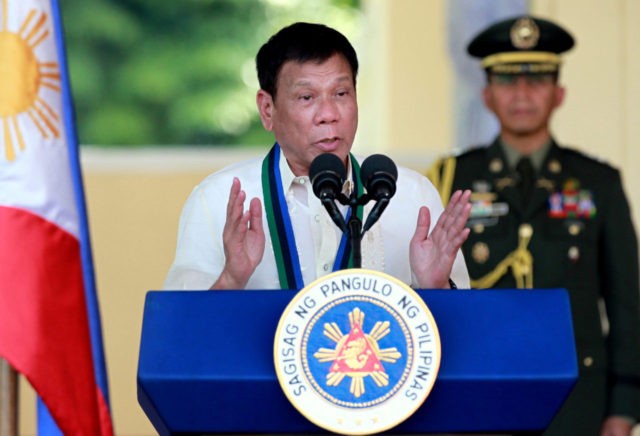Two mayors have publicly surrendered and two others begged for private meetings with President Rodrigo Duterte to absolve themselves of alleged ties to drug crime, as the Philippines continues Duterte’s promised assault on drug traffickers and drug addicts who refuse treatment.
Albuera town mayor Rolando Espinosa surrendered to police after a violent raid in which six of his personal bodyguards were killed trying to keep police out. Espinosa denies involvement in the Philippine drug trade while admitting that his son, Kerwin Espinosa, is one of the nation’s most high-profile traffickers, specializing in methamphetamine (“shabu,” as it is known in Filipino street slang). Duterte had personally issued a warrant for both father and son; Kerwin is still a fugitive.
It did not take a dramatic gunfight for Maguing mayor Mamaulan Molok to turn themselves in. He and Mohammadali Abinal, former mayor of the town of Marantao, surrendered to police after finding their names included on a list of 27 mayors nationwide police had evidence of having a hand in the drug trade, either leading drug-trafficking operations or giving local drug dealers their blessing. Philippine National Police (PNP) Director General Ronald “Bato” Dela Rosa said of the mayors, “they come in peace,” and used them as an example to drug suspects: Those who turn themselves in will be safe and have full access to the law.
Both mayors asked to become part of an “anti-drug campaign.” According to Dela Rosa, “they will be the ones leading the war against drugs in their respective municipalities.”
Two other mayors, who the government has refused to name publicly, also allegedly requested a private meeting with President Duterte and a chance to absolve themselves before being shot by police. The Philippine Star reports the mayors “wept before President Duterte” begging their lives be spared.
When Duterte took office in June, he did so with a mandate to take dramatic measures against drug crime. Drug-related violence has engulfed much of the Philippines, particularly the less wealthy southern regions, from which Duterte hails. Duterte served as mayor of southern Davao city for 22 years before becoming president. During his tenure, he made a name for himself by dramatically reducing the city’s violent crime rates, making it safe for international business. As president, he announced that he would use the leftover campaign funds in his account as bounties for civilians who kill wanted drug traffickers. He has called out international drug traffickers by name and warned that he would have police kill them if they did not surrender.
Duterte has also called for more funding for rehabilitation centers for addicts who need help staying off drugs. “Shabu” has become a particularly insidious problem for urban youth; an estimated 500,000 drug addicts have surrendered to authorities and agreed to undergo rehabilitation programs.
Duterte has offered aid to addicts while his administration retains its hard-line stance on those who enable their addictions. Speaking to the media on Thursday, police chief Dela Rosa said that bombing the homes of public officials believed to be enabling the drug trade is not out of the question: “If those providing them safe haven are armed, then we will request the Air Force to bomb the place.”
Estimates suggest nearly 500 people have been killed in anti-drug raids since June 30, Duterte’s inauguration day. The rate of killings of drug suspects has aroused the ire of human rights groups, who Duterte has repeatedly dismissed as “stupid” and told drug addicts not to “rely on.”
“If you don’t want to die and get hurt, don’t pin your hopes on priests and human rights (groups). They can’t stop death,” Duterte said in a recent speech.
He has also made clear that he has no fears of landing in prison for enabling extra-judicial killings.
“I don’t care about human rights… If I order the killing of someone, you cannot arrest me. I have immunity,” he told a crowd Friday. “After the end of my term, I’ll be 77. Where will you place me?”

COMMENTS
Please let us know if you're having issues with commenting.